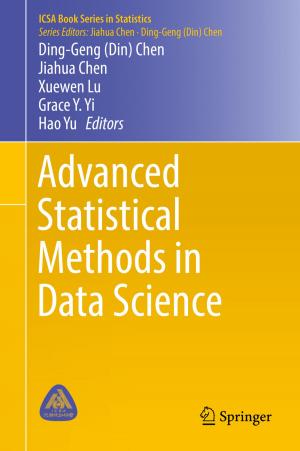Foundations of Commutative Rings and Their Modules
Nonfiction, Science & Nature, Mathematics, Algebra, History| Author: | Fanggui Wang, Hwankoo Kim | ISBN: | 9789811033377 |
| Publisher: | Springer Singapore | Publication: | January 6, 2017 |
| Imprint: | Springer | Language: | English |
| Author: | Fanggui Wang, Hwankoo Kim |
| ISBN: | 9789811033377 |
| Publisher: | Springer Singapore |
| Publication: | January 6, 2017 |
| Imprint: | Springer |
| Language: | English |
This book provides an introduction to the basics and recent developments of commutative algebra. A glance at the contents of the first five chapters shows that the topics covered are ones that usually are included in any commutative algebra text. However, the contents of this book differ significantly from most commutative algebra texts: namely, its treatment of the Dedekind–Mertens formula, the (small) finitistic dimension of a ring, Gorenstein rings, valuation overrings and the valuative dimension, and Nagata rings. Going further, Chapter 6 presents w-modules over commutative rings as they can be most commonly used by torsion theory and multiplicative ideal theory. Chapter 7 deals with multiplicative ideal theory over integral domains. Chapter 8 collects various results of the pullbacks, especially Milnor squares and D+M constructions, which are probably the most important example-generating machines. In Chapter 9, coherent rings with finite weak global dimensions are probed, and the local ring of weak global dimension two is elaborated on by combining homological tricks and methods of star operation theory. Chapter 10 is devoted to the Grothendieck group of a commutative ring. In particular, the Bass–Quillen problem is discussed. Finally, Chapter 11 aims to introduce relative homological algebra, especially where the related concepts of integral domains which appear in classical ideal theory are defined and investigated by using the class of Gorenstein projective modules. Each section of the book is followed by a selection of exercises of varying degrees of difficulty. This book will appeal to a wide readership from graduate students to academic researchers who are interested in studying commutative algebra.
This book provides an introduction to the basics and recent developments of commutative algebra. A glance at the contents of the first five chapters shows that the topics covered are ones that usually are included in any commutative algebra text. However, the contents of this book differ significantly from most commutative algebra texts: namely, its treatment of the Dedekind–Mertens formula, the (small) finitistic dimension of a ring, Gorenstein rings, valuation overrings and the valuative dimension, and Nagata rings. Going further, Chapter 6 presents w-modules over commutative rings as they can be most commonly used by torsion theory and multiplicative ideal theory. Chapter 7 deals with multiplicative ideal theory over integral domains. Chapter 8 collects various results of the pullbacks, especially Milnor squares and D+M constructions, which are probably the most important example-generating machines. In Chapter 9, coherent rings with finite weak global dimensions are probed, and the local ring of weak global dimension two is elaborated on by combining homological tricks and methods of star operation theory. Chapter 10 is devoted to the Grothendieck group of a commutative ring. In particular, the Bass–Quillen problem is discussed. Finally, Chapter 11 aims to introduce relative homological algebra, especially where the related concepts of integral domains which appear in classical ideal theory are defined and investigated by using the class of Gorenstein projective modules. Each section of the book is followed by a selection of exercises of varying degrees of difficulty. This book will appeal to a wide readership from graduate students to academic researchers who are interested in studying commutative algebra.















